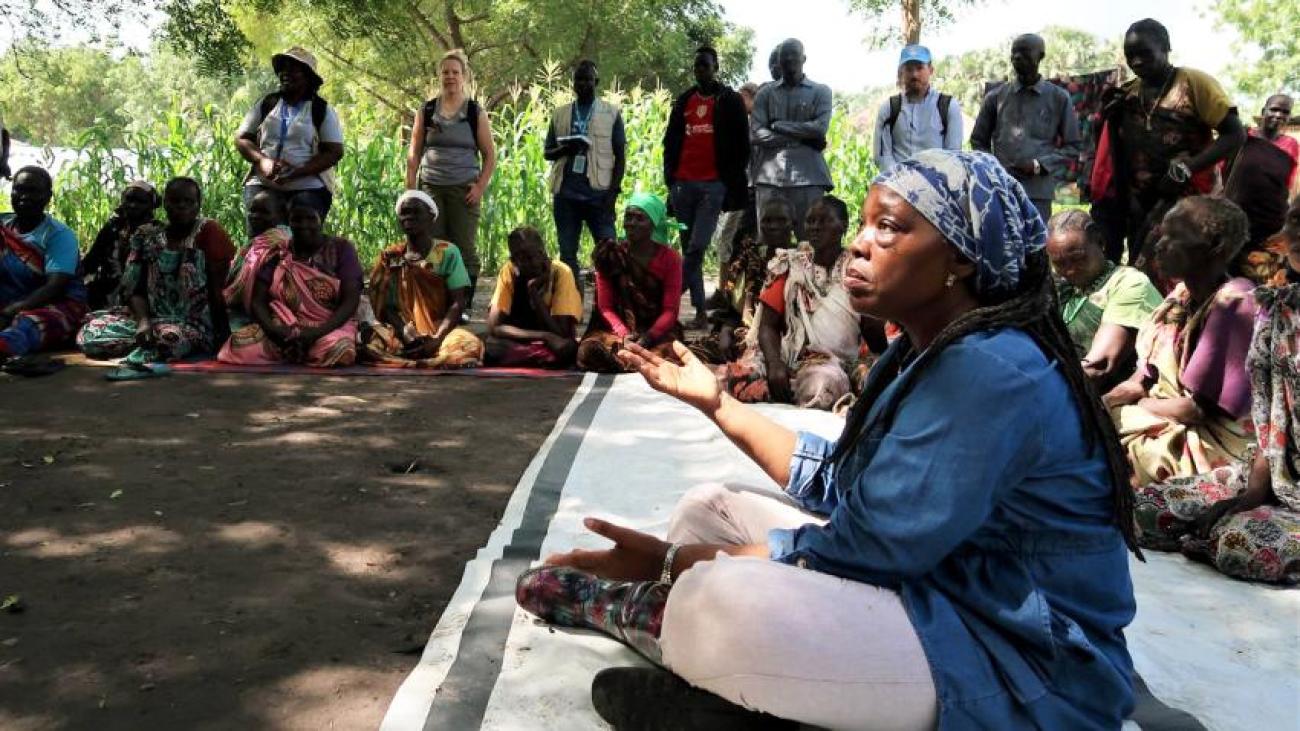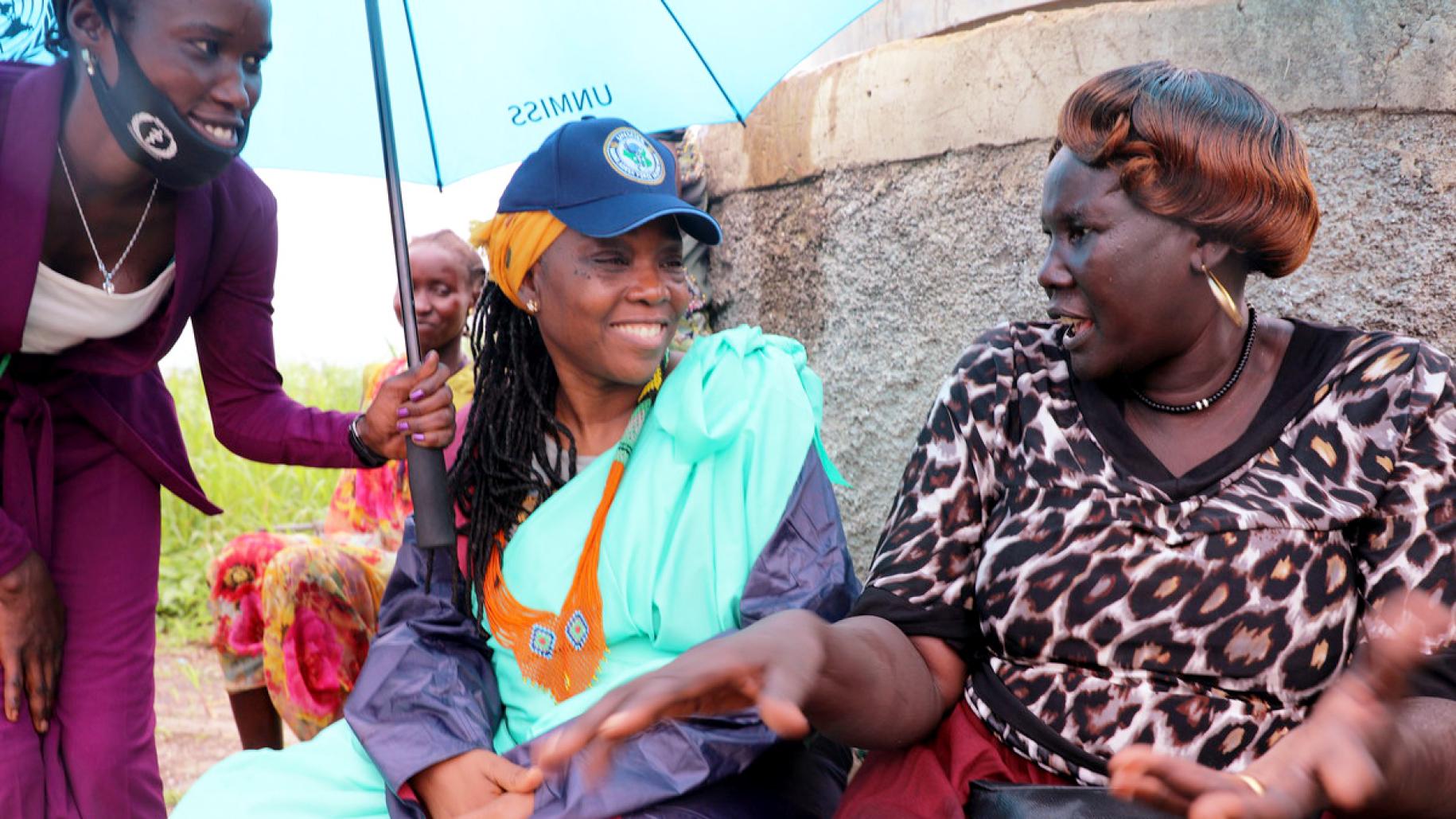The desperate decisions confronting South Sudan’s vulnerable communities

Few forget the scars of war. For Sara Beysolow Nyanti, who until recently was the UN Resident and Humanitarian Coordinator in South Sudan, conflict has left a profound mark on her personal as well as professional life.
Growing up in Liberia, the Resident Coordinator experienced first-hand the pain of a country ravaged by violence and the anguish of its long road to recovery.
Having completed her one and a half year assignment as Resident Coordinator in South Sudan, Sara encountered the suffering caused by violence and armed conflict on the one hand, and the mounting threat of climate change on the other.
In a recent podcast interview ‘Awake at Night’ with the UN Under-Secretary General for Global Communications, Melissa Fleming, the Resident Coordinator reflects on the devastating impacts of climate change across South Sudan, long-term prospects for peace and the desperate decisions facing the country’s most vulnerable.
From harrowing stories of violence and persecution, the challenge supporting communities displaced by flooding, to retaining a sense of hope amid the darkness, here is what is keeping Sara awake at night, and inspires her to keep going the next day.
Competing with snakes for dry ground
“For me, the most vivid picture I have in my mind right now is my trip to Canal Piji. The major issue the people there faced was having access to anti-venom. Because of the flooding, they were and still are competing with snakes for dry ground.
I met people who said they slept outside their houses, nights before we got there, because snakes were in the house seeking dry ground. It was mind-boggling that people would have to confront that just for their daily needs.”
Fleeing fighting and floods
“In Adidiyang, I met a woman who lost all her children. Fleeing with her children from the fighting, from the violence, she lost all her children in the flood. This woman was seated on the ground, and she didn't even lift her head to speak the whole while we were there. She and other women was seated on the ground, and I sat with them. We shared our concerns for them and our desire to help. We talked about practical solutions, how we’re providing services, distributing food and non-food items in a place that was very hard to reach.
Before we left, this woman stood and said- ‘We have nightmares. We can’t sleep at night.’ This issue of mental health rang so loudly. She didn't call it mental health. But she said, ‘We're scared.’ And she talked about losing her four children. My heart was crying while she was speaking."
"Just imagine how many women lost their children, their grandchildren, their entire families, fleeing one shock, confronting another, and not knowing what the next day will bring. That's why peace is so necessary. That's why peace is non-negotiable. We have to put the rights of people and the peace that they deserve upfront. We have so much work to do in South Sudan. But I believe we're well placed to do it."
The injustice and risk facing women
“The vulnerability of the girl child in South Sudan is so painful. Talking to a young girl who told me that every day that she decides to go to the town to go to school, she takes a risk, and she knows that there's a chance she could be raped. Or talking to a group of women in an IDP camp where they share that when they go for firewood the chances are high that they would be raped.
When I triangulate all of that, the only word that comes to my mind is injustice. It’s unjust. For a young girl, all she wants is just to go to school and have the opportunity to be wherever she wants to be. It's unjust for her to have to choose.”

On desperate dilemmas
“How can I sit there as a leader with responsibilities in terms of decision making on resources? How can I not have sleepless nights when you have to choose between whether you fund the services for gender-based violence, or whether you fund the services for feeding? Because for some children, it's only that one meal in school that they have all day.
So, when I take it back to the conversation around access to resources, to global aid infrastructure, and how aid is playing out now in the wake of the Russia-Ukraine scenario, it's unjust. The commitments made to meet the needs of these young girls and the most vulnerable people should be met.”
Coming from a stock of strong women
“My mother is considered a disciplinarian, she worked extremely hard. I remember her selling cassava and shortbread and cornbread and gravy, working, and then taking food to work with her to sell, and selling on the weekends just to have an additional source of income.
Coming from that stock of strong women, the strength is somewhere there inside of you. You learn it. You see it. It becomes a part of you, and you know that there's no other option. You have to persevere because those before you persevered.
Those after you should not have it as difficult as those before you did. We owe it to the girls that are coming after us, to the children coming after us, to make the world a better place for them. They shouldn't have to come and suffer the same things that those before them did. That's why we work. And that's why we do it.”
Good exists in each of us
“Everywhere we serve, we have different degrees of risks and vulnerability. South Sudan is no exception. It's a very risky and vulnerable situation. But at the end of the day, we serve. We serve primarily, and it's a joy to serve.
My faith and my belief in humanity is what sustains me. I believe in what we're working for. I believe in what we stand for. I really do believe we are that neutral broker that can facilitate, can catalyze, can convene, and ensure that we bring people together around how the good of what exists in each and every one of us can be mobilized to have transformative gains in the countries that we serve
That's why I'm so proud to have had the opportunity to serve in the capacity I’ve served. Looking at the UN reform and all that's happening with the Resident Coordinator system - I'm so proud to be a part of that because it’s about doing more with less and trying to streamline in a way that ensures that we work together as one system."
This interview has been edited for clarity. Listen to the full interview and read the full transcript here. To learn more about the work of the UN in South Sudan visit southsudan.un.org













